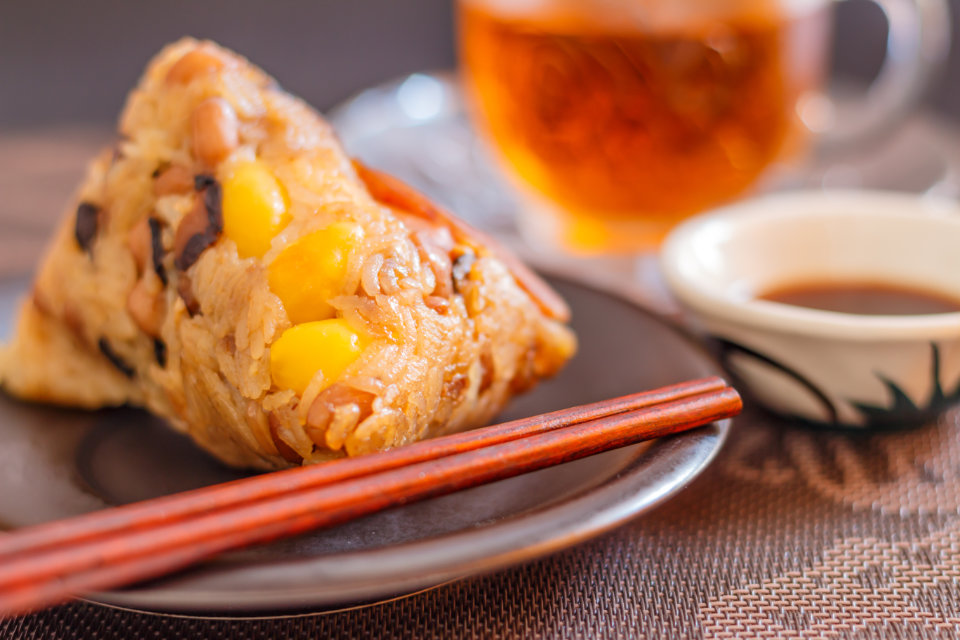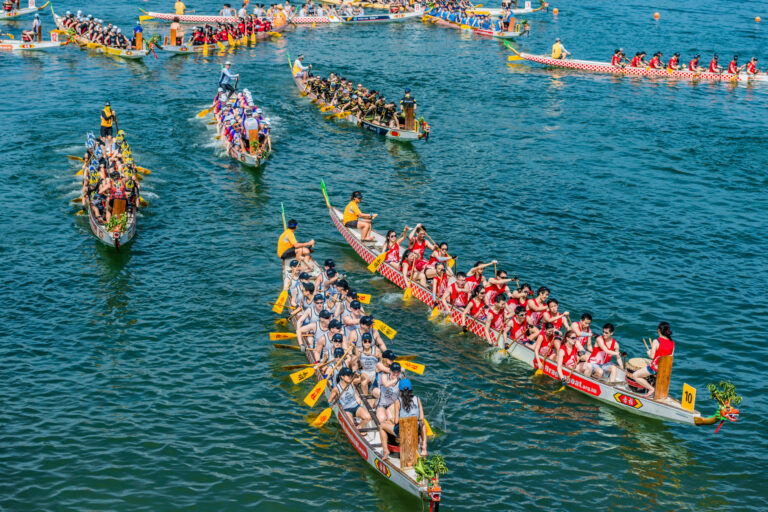The Dragon Boat Festival, known as Duanwu Festival in Chinese, is a traditional holiday celebrated in various parts of the world.
Originating in China, it has spread its cultural significance to other countries. Let’s explores the diverse customs and traditions observed during the Dragon Boat Festival in different regions, both in China and overseas.
From dragon boat races and zongzi (sticky rice dumplings) to the use of herbs and ancestral worship, each location adds its unique flavor to this vibrant festival.

Table of Contents
In China
Fujian
The Dragon Boat Festival customs in various parts of Fujian mainly include:
- boiling water to wash the body,
- smoking yellow incense,
- offering fish,
- performing suona dances,
- dragon boat races,
- tying colorful silk threads,
- bathing with orchid grass water,
- gathering medicinal herbs as noon tea,
- ancestral worship,
- catching ducks on water,
- eating peaches, zongzi, jian dui, and Taipingyan (a type of rice dish).
In Putian, the Dragon Boat Festival is also known as the “Five-Day Festival.”
There is a folk rhyme that goes, “First day cake, second day zongzi, third day snails, fourth day mugwort, fifth day ‘climbing the dragon boat’.” This rhyme describes the Dragon Boat Festival customs in the Putian area.
Traditional Dragon Boat Festival activities in Fuzhou include ten main activities, summarized in a folk song as follows:
- Drums sound on Dragon Boat Festival,
- Bellies wear spring costumes;
- Dragon boat races on the river,
- Fragrant sachets hang on children’s collars;
- Families busy wrapping zongzi,
- Every household joyfully displays calamus leaves; to dispel evil,
- Drink aromatic yellow wine
- Tie five-color talismans;
- After the yellow incense is burnt,
- Stick the noon-time book.
In Fuzhou, it is traditional for daughters-in-law to offer their parents-in-law birthday clothes, shoes, zongzi, and fans on this day. Jianyang County designates the fifth day as the day to dry medicinal herbs, and households use this day to make soy sauce.
Before the Dragon Boat Festival in Shaowu Prefecture, women use red silk bags to hold talismans. They also use five-color velvet to make square-shaped ornaments, which are then tied to hairpins.
Young girls hang them on their backs, and they are called “Dou Niang.”
Jiangsu
Suzhou is the birthplace of dragon boat racing during the Dragon Boat Festival in Jiangsu. Apart from dragon boat races, the Dragon Boat Festival customs in Jiangsu include eating zongzi, drinking realgar wine, and having a festive banquet called “Wuhuang Yan.”
The festival is decorated with five venomous creatures, Artemisia and calamus leaves, images of Zhong Kui, and colorful threads wrapped around the arms. They also hang silk thread zongzi and wear clothes with five venomous creatures.
In the Jiangnan region, there is a unique custom of expelling toxins and warding off evil spirits, known as “Xiaochikou Baishi.”
They hang images of Zhong Kui and Guan Yu in their homes and offer vases with Artemisia and calamus leaves. They also write certain phrases on red paper and post them outside their doors, all aimed at removing evil spirits.
Yi Zheng County has a local proverb that says, “Buy yellow fish and pants” for the Dragon Boat Festival.
In Nanjing, everyone in the family washes their eyes with a box of clear water mixed with a little realgar and two coins, believed to protect them from eye diseases for a year.
Wujin has a nighttime dragon boat performance, with small lights hung on the dragon boats, accompanied by the sound of flutes and drums.
Jiading County, regardless of wealth, must buy sturgeon (commonly known as “fish king”) to cook and eat during the Dragon Boat Festival.
Guangdong
Guangdong has numerous Dragon Boat Festival customs, including:
- paddling dragon boats,
- eating zongzi,
- inserting Artemisia and calamus,
- “dotting the dragon’s eyes,”
- worshiping gods and ancestors,
- praying for blessings and warding off disasters,
- collecting “noon-time water,”
- watching dragon boat races,
- dragon boat meals,
- gathering for festive banquets,
- flying kites made of paper,
- washing herbal water, and
- soaking dragon boats in water, and more.
Hainan
In Hainan, during the Dragon Boat Festival, in addition to making and eating zongzi, there are traditional customs such as washing dragon boat water, dragon boat races, warding off five poisons, and ancestral worship.
“The Records of Yazhou” recorded that “In May, on the Dragon Boat Festival, there are dragon boat races held in Baoping Village. People make angle zongzi, offer sacrifices to ancestors, and exchange gifts. They also collect reed flowers, fragrant herbs, and calamus leaves, soak them in water as offerings to the gods, and use them for bathing.
Some hang Artemisia at the door to ward off diseases. On this day, men and women gather at the harbor to watch the dragon boat races. Children fly various kites, competing for height.
In Lechong, Yuanchong, and Lifu Sanli, thousands of people gather, engage in fights, and fly kites.
Even the authorities cannot stop this tradition.” It can be seen that in ancient times, the people in the Yazhou area had rich and diverse celebrations before and after the Dragon Boat Festival.
Guangxi
The Dragon Boat Festival customs in Guangxi mainly include dragon and lion dances, waist drums, and other folk art performances.
In the southern region of Guangxi, such as Ningming, Chongzuo, and Longzhou, they make “gray water zongzi,” which is called Huishui Zongzi. Before making zongzi, they first gather branches and leaves from trees such as the Chinese toon tree.
They dry them in the sun until they are semi-dry, then stack them on the ground and burn them. The resulting ash is put into a bamboo container and filtered with clear water. Finally, the prepared glutinous rice is soaked in the filtered pale yellow water.
After soaking, the glutinous rice emits a unique fragrance of grass and ash, and the cooked zongzi is often light yellow or brownish yellow.
Zhejiang
The Dragon Boat Festival in Zhejiang is a special festival with a long history and rich culture and customs.
In a general sense, the common customs include ancestral worship, dragon boat races, eating zongzi, offering dragon heads, dotting the dragon’s eyes, wearing red, hanging Artemisia and calamus leaves, tying colorful threads, drinking realgar wine, eating “Wuhuang” (a dish with five yellow ingredients), wearing scented sachets, gathering medicinal herbs, and more.
In addition to these customs, Wu Yi and Quzhou in Jinhua have the custom of eating garlic during the Dragon Boat Festival.
In Jinhua, the tradition of daughters giving their parents “Dan Du” on the Dragon Boat Festival is still practiced. Daughters prepare a basket of zongzi, with five zongzi tied together as a small bundle, and two small bundles tied into a gift for their parents.
At the same time, they also give pork and other accompanying gifts. Different regions have variations in customs and details.
In Ningbo, the “Dan Du” mainly consists of fish, goose, and wine, wrapped in a basket, with a minimum of four colors and up to twelve colors. Relatives also exchange these gifts, which is called “sending the festival.”
Jiangxi
The Dragon Boat Festival in Jiangxi includes customs such as eating zongzi, drinking realgar wine, hanging Artemisia and calamus, making dou niang (a type of headwear), weaving colorful ropes, wearing scented sachets, writing calligraphy, wearing colorful ropes, and participating in dragon boat races.
In Jianchang Prefecture, Jiangxi, people bathe with herbal water on the Dragon Boat Festival to prevent scabies. In Xinchang County, people drink realgar and cinnabar wine, called “opening the eyes.”
Anhui
The Dragon Boat Festival customs in Anhui mainly include stepping on various herbs, visiting the maiden’s family, dragon boat races, urban-style zongzi, rural-style ba (a type of sticky rice snack), inserting Artemisia and calamus, drinking realgar wine, hanging scented sachets, wearing colorful silk zongzi, and competing in herb identification.
There are generally two types of herb identification competitions: one is to compete in naming the herbs, answering with the names of roadside herbs; the other is to compete in the toughness of the herbs, with the strongest one being the winner.
On the Dragon Boat Festival, urban residents usually eat zongzi, while rural residents eat “daye ba” (a type of sticky rice snack made with large leaves).
Hunan
The Dragon Boat Festival customs in Miluo, Hunan, mainly include hosting family banquets, eating zongzi, inserting Artemisia and calamus, drinking realgar wine, participating in dragon boat races, watching dragon boat races, visiting the maiden’s family, bidding farewell to the festival, as well as singing praise, launching dragon boats, adding red to the dragon’s head, and paying respects at temples.
These customs have unique cultural significance related to the worship of Qu Yuan and other traditions.
In Yuezhou Prefecture, Hunan, dragon boat races are held to ward off disasters and diseases. They also float grass boats on the water, which is called “sending the epidemic.”
Yunnan
The Dragon Boat Festival customs in Yunnan include welcoming gods, making offerings, making initial offerings, making secondary offerings, enjoying the blessings and feasts, looking at the fire (offering to the gods), and other activities.
There are also programs such as wearing Hanfu (traditional Han Chinese clothing), reciting poems, performing Yue opera, and ceremonial archery.
In Pu’er, Yunnan, locals do not eat zongzi during the Dragon Boat Festival but instead consume medicinal roots.
Sichuan
During the Dragon Boat Festival in Sichuan, people mostly eat zongzi, salted eggs, and Chinese spinach. In Shizhu County, there is a custom called “Chu Duanwu Lao” (the appearance of the Dragon Boat Festival deity).
Four people carry a large table covered with a red carpet using two bamboo poles. On the carpet, there is a Taoist priest made of bamboo strips, who beats a gong and drum as he parades through the streets.
In the past, there was a tradition of “throwing plum fruits” during the Dragon Boat Festival in western Sichuan.
On this day, people in Chengdu would buy plums and throw them at the southeast corner of the city wall. Tens of thousands of people would gather to watch.
However, in 1895, a conflict broke out between people throwing plums and foreign missionaries, resulting in the end of this tradition.
During the Dragon Boat Festival in Leshan and Xinjin, there is a grand trade fair held alongside the dragon boat races.
Guizhou
The “You Baibing” (touring to avoid epidemics) custom is prevalent during the Dragon Boat Festival in Guizhou. People go to the mountains to gather Artemisia and calamus, and they believe that wearing these herbs can ward off evil spirits and epidemics.
The local custom in Sandu County is to take Artemisia and calamus water baths to prevent diseases. They also have the tradition of “washing the dragon boat.”
On the Dragon Boat Festival, people gather to wash the dragon boat with clear water from the mountain spring, aiming to drive away evil spirits and promote good luck.
In addition, there are customs such as eating zongzi, racing dragon boats, flying kites, and performing folk dances.
Overseas
Germany
The cultural practice of dragon boat racing during the Dragon Boat Festival has taken root in Germany for a full 20 years. In 1989, dragon boat activities were introduced to Germany and the first “Dragon Boat Festival” was held in Hamburg.
Since 1991, dragon boat races have been held in Frankfurt, the financial center of Germany, and have continued to this day.
To ensure fairness, the organizers provide the dragon boats for the competition, each accommodating 20 people, and participants are allowed to use their own paddles. Whether on the river or on the shore, the atmosphere during the races is always lively.
United States
Since the 1980s, dragon boat racing during the Dragon Boat Festival has quietly become part of the sports culture of some Americans, becoming one of the fastest-growing popular sports and entertainment events in the United States.
Dragon boat races in the United States have spread from California on the West Coast to New York on the East Coast and have expanded to coastal and inland states. Dragon boat races are held continuously from June to October on weekends.
United Kingdom
In the UK, the influence of the Great Britain-China Dragon Boat Festival has been expanding year by year and has become the largest dragon boat racing event in the UK and even in Europe.
Vietnam
In Vietnam, the Dragon Boat Festival, known as “Duanwu” in Vietnamese, is celebrated on the fifth day of the fifth lunar month, also known as the Zhengyang Festival.
The festival has the custom of eating zongzi and driving away pests. Gathering medicinal herbs during the Dragon Boat Festival is an essential activity, and people believe that the “Dragon Boat Festival herbs” are most effective.
Japan
After the customs of the Dragon Boat Festival were introduced to Japan, they merged with the local culture and were transformed into traditional Japanese customs.
The fifth day of the fifth lunar month, known as the “Wu Yue Duanwu,” is considered a festival for men as the sun reaches its zenith, symbolizing the yang energy.
Although dragon boat races are not held in Japan on this day, they also eat zongzi and hang calamus leaves in front of their homes.
South Korea
The Koreans refer to the Dragon Boat Festival as “Seongil,” meaning “divine day.” In the official document declaring the “Dragon Boat Festival Ceremony” in South Korea, the first sentence states, “The Dragon Boat Festival was originally a Chinese festival that has been in Korea for over 1,500 years.”
This shows its origin in China, and its original name, “Gangneung Festival,” has a history of over 1,000 years. It was not until 1926, when the festival’s timing overlapped with the Chinese Dragon Boat Festival, lasting from the 15th day of the fourth lunar month to the 7th day of the fifth lunar month, that it was renamed the “Gangneung Dano Festival.”
The Gangneung Dano Festival in South Korea originated from the mountain god festival during the Silla Dynasty and was originally a celebration of abundant harvests by village farmers, with a history of over 1,000 years.
The Gangneung Dano Festival in Korea consists of various elements, including dance, shamanistic rituals, and folk art exhibitions. The rural areas of Korea have a strong festive atmosphere during the Dragon Boat Festival.
On the fifth day of the fifth lunar month, families gather together in traditional Korean clothing to eat and chat. Traditional foods include wheel cakes, and activities include swinging on a swing.
Singapore
As a country with a significant Chinese population, with over 70% of its population being of Chinese descent from different provinces of China, primarily Fujian and Guangdong, early immigrants brought the customs of celebrating the Dragon Boat Festival to Singapore.
As Singapore gradually modernized, these customs have been simplified. Traditional practices such as wearing scented sachets and hanging calamus leaves are rarely seen in Singapore, but traditions like eating zongzi and participating in dragon boat races are still well-preserved.
The Chinese community in Singapore celebrates the Dragon Boat Festival with activities such as eating zongzi and participating in dragon boat races. With people from different regions of China residing in Singapore, there is a wide variety of zongzi, including traditional Fujian-style meat zongzi, Guangdong-style alkaline rice dumplings, red bean paste zongzi, and more.
Dragon boat racing has also become a popular sports activity in Singapore.
How Do You Celebrate Dragon Boat Festival?
The Dragon Boat Festival, deeply rooted in Chinese culture and embraced by people worldwide, is not only a vibrant celebration but also a harmonious blend of Feng Shui elements.
From the exhilarating dragon boat races to the delectable zongzi and distinctive customs, this cherished festival unites communities, fosters cultural appreciation, and embodies the timeless principles of Feng Shui.
Embracing the Dragon Boat Festival is an opportunity to honor tradition, revel in the spirit of togetherness, and invite auspicious energies into our lives.
How does your community celebrate the Dragon Boat Festival, and what customs hold special meaning to you?
What is the Dragon Boat Festival?
The Dragon Boat Festival, also known as Duanwu Festival, is a traditional Chinese holiday celebrated to commemorate the poet Qu Yuan. It involves dragon boat races, eating sticky rice dumplings, and hanging up pouches of herbs.
When is the Dragon Boat Festival?
The Dragon Boat Festival is usually celebrated on the 5th day of the 5th month of the lunar calendar, which typically falls in May or June.
Why is the Dragon Boat Festival celebrated?
The festival is celebrated to honor Qu Yuan, a famous poet and statesman of ancient China. It is believed that people raced dragon boats and threw rice dumplings into the river to prevent fish from eating Qu Yuan’s body after he drowned himself.
What are dragon boat races?
Dragon boat races are a popular highlight of the Dragon Boat Festival. They involve teams of rowers paddling in long narrow boats to the beat of a drum, symbolizing the search for Qu Yuan’s body in the river.
What are sticky rice dumplings?
Sticky rice dumplings, also known as zongzi, are traditional pyramid-shaped dumplings made of glutinous rice wrapped in bamboo leaves. They are usually filled with various ingredients like meats, beans, and nuts.
How are Dragon Boat Festival pouches significant?
Dragon Boat Festival pouches, known as xiongzhong, are small silk bags filled with medicinal herbs. They are hung up in homes or worn to ward off evil spirits and bring good luck and protection.
Is the Dragon Boat Festival a public holiday?
The Dragon Boat Festival is a public holiday in China. However, its observance may vary in different regions.



